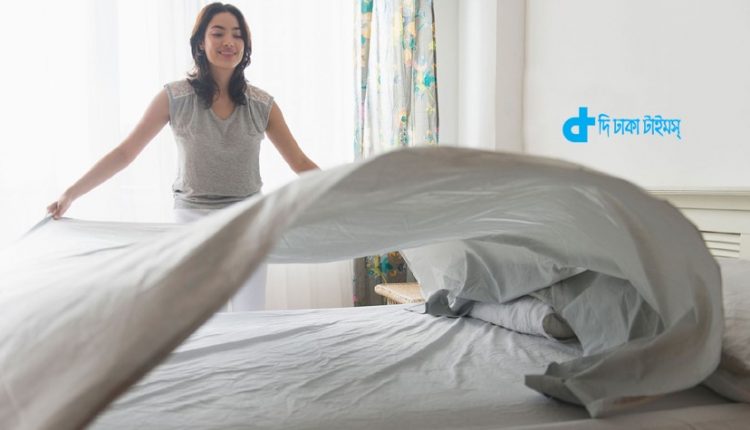The Dhaka Times Desk Doctors say that sleeping on unclean sheets causes various skin problems. What skin problems can arise due to the use of the same sheet for a long time?

Apart from exercise, another step to staying healthy is keeping your bed sheets clean. As soon as you lie down on the bed with the sheets pulled tight, your eyes feel sleepy - that's normal. But it's not enough to use it, you have to keep it clean. It is generally not advisable to use a sheet for more than a week. It is better to wash the sheets once in a week. Sleeping on unclean sheets can also cause various skin problems. What skin problems can arise due to the use of the same sheet for a long time?
acne
Some habits like eating food with external oil spices, drinking less water, not exercising are one of the causes of acne. But apart from these, sleeping on dirty sheets can also cause acne. Anything left unattended can harbor bacteria. Acne occurs due to the bacterial infection in the skin cells. It is better if the bed sheets can be changed every 2/3 days.
Fungal infection
Using the same sheet for a long time without cleaning increases the risk of fungal skin infection. Even in the rainy season, the incidence of such diseases is a little higher. Unhealthy habits on top of that can increase that risk. But it is important to change sheets frequently throughout the year, not only during the rainy season.
athlete's foot
Athlete's foot is another aspect of fungal infections. It can cause spots on different parts of the body. This type of infection is more spread from unclean sheets. Once this skin problem occurs, it does not want to be cured easily. So if you don't take risk in this rainy season, you have to change the sheets every 2/3 days. Source: Anandabazar Patrika.
>>>>>>>>>>>>>>
How to prevent dengue
Dengue is a mosquito-borne viral fever. This fever is different from other viral or bacterial fevers. However, this fever is not contagious in any way. This viral fever can occur alone or in combination with other viruses (chikungunya, yellow fever, Burma forest, flu, respiratory syncytial) and bacteria (pneumococcus).
Dengue fever is divided into two categories depending on the severity of symptoms and fever.
1. Common dengue fever
2. Dengue fever with bleeding.
In the case of common dengue fever, the following symptoms are mainly seen-
1. Sudden high fever lasting 2 to 7 days.
2. Severe headache.
3. Pain behind the eyes.
4. Along with the fever, red rash appears all over the body.
5. Severe pain in whole body as well as back pain.
6. Nausea or vomiting.
7. A rash or red bumps on the skin.
In case of dengue fever with bleeding:
1. Bleeding from nose, mouth or vomiting with high fever within 2 to 48 hours.
2. Fluid accumulation in chest or abdomen along with fever.
If any of these symptoms appear, seek medical attention immediately.
On the other hand
Wait at home for the first 3 days of fever. On the other hand, sponge the whole body with water every now and then. This will reduce the level of fever. Drink enough water and rest. After that, if the fever does not decrease or if it continues to increase after some time, consult a doctor immediately.
Things to do to prevent Dengue:
1. Try to keep the surroundings of the house as clean as possible.
2. If there are flower tubs or broken plastic bottles, can shells, tires or polythene inside the house, clean them quickly and drain the accumulated water from the flower tubs.
3. Spray or fog at least 3 times a week to kill mosquitoes.
4. You can keep mosquito repellent cream with you while going out.
5. After evening, younger and older members of the household should use mosquito nets.
6. Clean up any accumulated rain water, as this is the time when Aedes mosquitoes lay their eggs.
7. On the other hand, you can use mats along with mosquito nets to avoid mosquito infestation.
8. Since Aedes mosquitoes bite during the day, it is important to avoid sleeping with mosquito nets while sleeping during the day. Source: https://dmpnews.org


